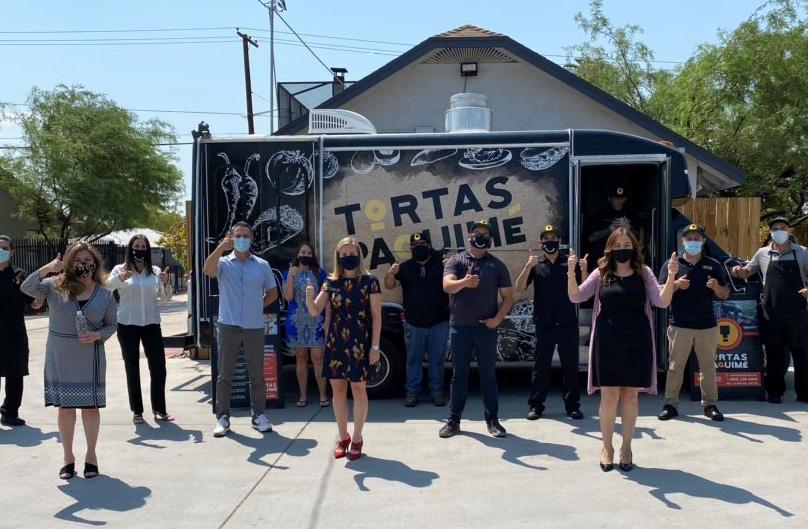
15 minute read
COVER STORY Mayor Kate Gallego: Fierce advocate for our future
Kate Gallego’s path to becoming mayor of Phoenix started when she won a runoff election with Daniel Valenzuela on March 21, 2019. The election was called after former Mayor Greg Stanton resigned his seat on May 29, 2018, to run for Congress. Upon winning the election, Kate became the second elected female mayor and the third Jewish mayor in Phoenix history. She is also the youngest “big city” mayor in the United States.
On November 3, 2020, Kate kept her title by winning more than 60% of the votes; as she starts her full four-year term, this will be the first time she will not be on the ballot since 2017.
Before being elected mayor, Kate was elected to the Phoenix
City Council in 2013 and served until 2018. She also worked for Salt River Project on strategic planning and economic development to attract new companies and high-paying jobs to
Phoenix.
She grew up in Albuquerque, NM, where she attended school at Albuquerque Academy, starting her political career as student body vice president. After high school, she attended Harvard
University, earning a bachelor’s degree in environmental studies, and then went on to earn an MBA from the Wharton School of
Business at the University of Pennsylvania.
Kate was in the national spotlight as a guest on CNN, ABC,
CNBC and MSNBC over the summer when Arizona became a hot spot in the nation for COVID-19. Her appearances resulted in the federal government committing to more testing resources in Phoenix. She’s also been a fierce proponent for mask-wearing and hasn’t been shy about her displeasure with state leaders for implementing stay-at-home orders too late and lifting them too early.
Although the mayoral election is officially nonpartisan, Kate is a Democrat and tweeted this on election day, “President-elect @
JoeBiden. Vice President-elect @KamalaHarris. An incredible moment for our nation.” Arizona turned “blue” during the 2020 election, something it has not been since 1996.
Kate carved out some time from her busy schedule to share
continued on next page
Above: Mayor Gallego stopped by local business Tortas Paquime with the Arizona Hispanic Chamber of Commerce to hear how local businesses adapting and working through the pandemic. Mayor Gallego also donated face masks for their use.
Opposite page: Valley Mayors, Kate Gallego (Phoenix), Corey Woods (Tempe), Anna Tovar (Tolleson) and Kenn Weise (Avondale) getting flu shots together to promote a safer flu season amidst the Covid-19 pandemic.
with Arizona Jewish Life her thoughts on the election, the challenges she faces, her Jewish faith and traditions and Phoenix’s future.
This year’s election was unprecedented in many areas. What did you learn from it that will help you in the future?
I learned new ways to reach people. In the past, I’d relied more often on in-person contact as a way to connect with voters. In 2020, because of the technology that’s now available to us and the restrictions caused by the pandemic, we were able to communicate with people all over the city and do it in real time. I’ve always wished I could be in two places at one time, and this campaign was the closest I’ve ever come to that – I could do an event in Ahwatukee, followed immediately by another in north Phoenix.
What are some of the challenges you have faced being a woman, and one of the youngest,
in your position?
When I was first campaigning for city council, I struggled a bit with the first impression that a young, short woman can sometimes make. One story that sticks in my mind happened when I was doing ‘knock-and-talks’ with voters in Council District 8. A man opened the door and said to his wife, “A little girl is here for you.” I wasn’t sure that was exactly the impression I wanted to make as someone who hoped to be a leader in the nation’s fifth-largest city!
As mayor, what accomplishment(s) are you most proud of?
I am very proud of the city government’s response to COVID-19 in the face of unprecedented needs from our residents. I hope I played a role in being a voice for public health, data-driven decisions, and support for community members who are hurting. When Phoenix was the largest city in the country not to receive federal surge testing resources, I worked hard to change that. I have worked with my colleagues on the city council to provide much-needed help to small businesses that have been hit especially hard by the pandemic. We have made our largest commitments to fighting homelessness, and we have also provided support to people struggling to pay rent and utility bills.
I’m also proud of the way individual city of Phoenix employees stepped-up to meet the challenge. They developed our mobile COVID testing van program and community testing events. City employees made the testing events possible, even though they’d never done that kind of work before. We had people from multiple departments, including the library and parks departments, handling check-in at the testing sites and Phoenix first responders handling logistics. It was an extraordinary collaborative effort.
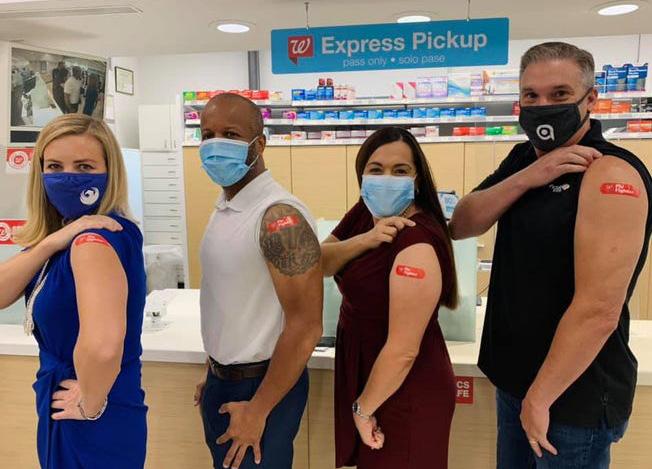
What do you do in your downtime?
I love spending time with my son, who is three years old. We just visited the new Fiesta Bowl PLAY at Hance Park,
a terrific playground that is part of the park’s renovation. He absolutely loves the climbing wall! He’s also very interested in plants and animals. He loves visiting the Desert Botanical Garden and the zoo. After our last visit to the gardens, though, he did mention that it needs more carnivorous plants. Apparently, you can never have too many Venus flytraps!
Who has had the most significant influence on your life?
My parents, without a doubt. They have always been very community-minded and focused on giving back. From very early on, we also received a strong message, from them both, that family is central and that you need to invest in family by spending quality time together.
I also learned a lot from Janet Napolitano and Terry Goddard. Right after I graduated from college, I went to work for then-Governor Napolitano. Through her, I learned the importance of getting things done, and accomplishing those things with my sense of humor intact.
Terry Goddard has been a great mentor to me. I often call him during tough situations, and he provides a great perspective. He has also helped me develop several policies, including the city of Phoenix’s efforts to outlaw dirty money, which the voters overwhelmingly supported.
What is something our readers would be surprised to learn about you?
On Sundays, I make pancake breakfast for my family. I have been trying to make a new type of pancake every week. This week’s pancake was banana and pecan, with Arizona pecans.
Softball is my favorite sport. I grew up playing on a very competitive team that was also incredibly diverse. We had players from Native American communities to Mormon communities. I was the only Jewish player, and the first Jewish person some of my teammates had met.
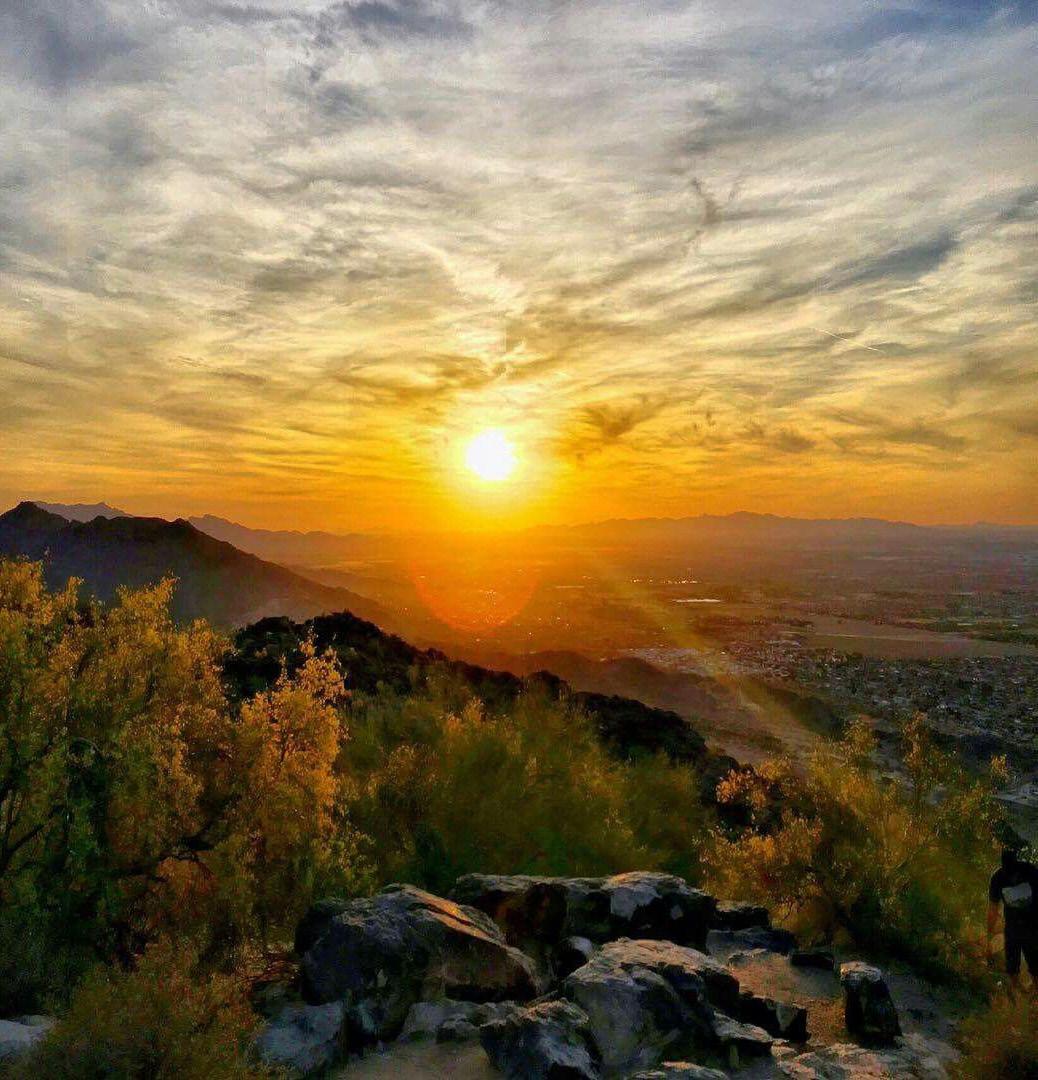
What are some of your favorite things about living in Arizona?
Two of the things I love most about Arizona and Phoenix, in particular, are the open space and the stunning sunsets. It’s a point of pride for me that Phoenix has more acres of parks than any other city in the country.
My home is near South Mountain Park, and I get out there as often as I can, whether on morning runs or hikes with my son. During this time of COVID, one of my goals has been to try as many new trails as possible, but I still haven’t hit them all.
Your parents were attorneys; did you ever want to go into law?
Yes, I did think about it because of the way it often intersects with public policy. However, my parents warned me against doing anything that involved billable hours because that way of working can be so constraining. I ended up deciding to do the MBA because so many public policy decisions hinge on how we spend the funds voters have entrusted to us. I am also very interested in economic development and job creation. I aspire to be an entrepreneur someday.
Were you raised in an atmosphere of public service?
My parents were more focused on nonprofit work and volunteering, less so on politics. So, they would get involved
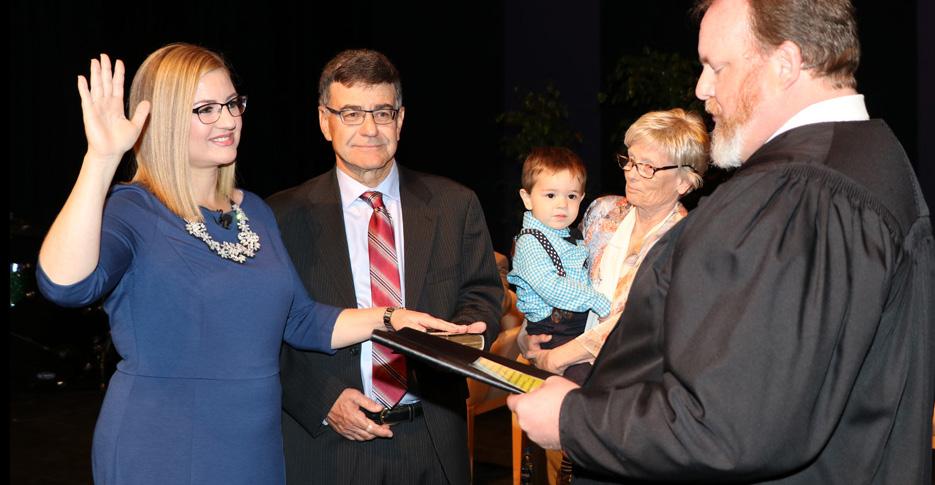
in things like the cancer society, Girl Scouts, food banks, or local projects like planting trees in our neighborhood.
My interest in government began in high school. I had asthma, which led to an interest in air quality. It seemed to me that government was key to solving the challenges with air quality by bringing people together, working toward a goal and acting as an important convener for sharing good ideas. That eventually led to a degree in environmental studies. As time went on, my interests broadened to include land use, planning, economic development and much more.
Also, as a kid, I loved the game called Sim City. You got to plan and build a city of your own and solve its problems. It turned out to be a great precursor to what I do now. I’ve often thought my 12-year-old self would be quite impressed if she knew what I am up to these days!
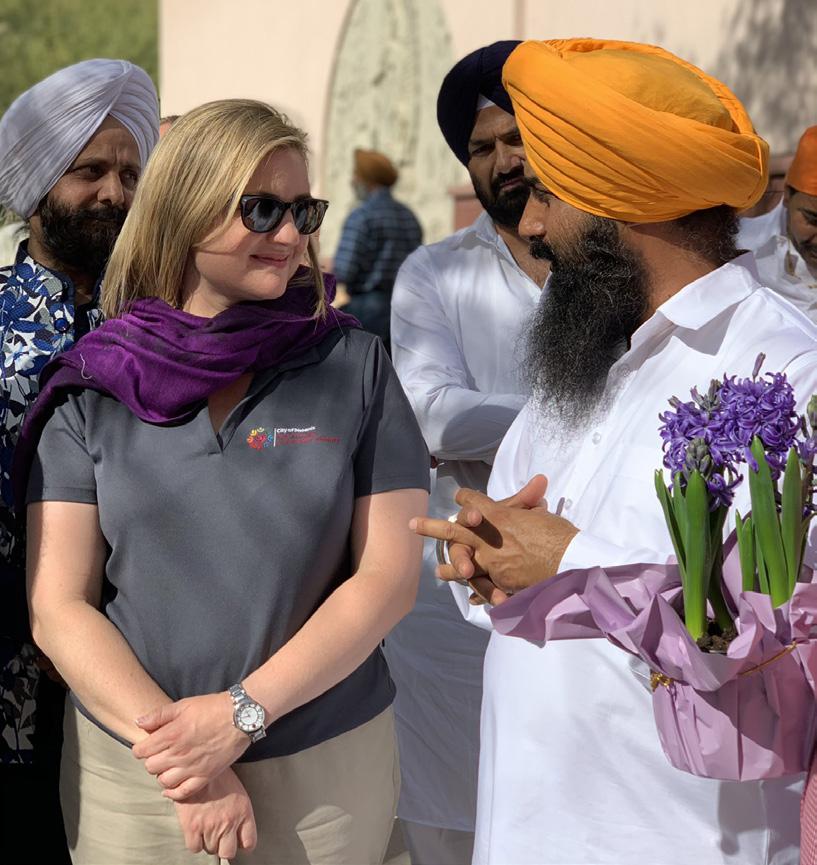
You were raised and celebrated your bat mitzvah in Albuquerque; how would you describe your Jewish upbringing and influence today?
Jewish values are very important to me. Each Jew has a role in making the world a better place. Our faith teaches a strong belief that each individual has inherent dignity and worth; that has informed my political outlook.
I love the emphasis in Jewish tradition on justice and fighting for the little guy. Great Jewish leaders stood up to bullies.
Most often, I find myself reflecting on my faith and values when dealing with issues around homelessness, people who are about to lose their homes, and those who don’t have enough to eat. During COVID, as much as ever, I’m thinking about those values and why it is so important to fight for everyone during this tough year. What are some of your Jewish traditions?
We have always had a big emphasis on bringing family together for the High Holy Days and for Seder. In fact, this was our first year ever doing Seder online. My friend and colleague, Dr. Heather Ross, introduced me to the idea, calling it a Zeder – a word that combines Zoom (the online platform) and Seder into a great concept.
My family celebrates Shabbat almost every week. My mom makes fresh challah, and I look forward to it all week. I am still trying to convince my son not to blow out the candles – candles, to him, still mean a birthday party!
What made you decide to run for mayor?
I feel like we’re at a transformative moment in the city of Phoenix. It’s a privilege to serve at a time when we are deciding what the future of this city will be. I believe we are on the cusp of being a great international city that is smarter and more globally connected. Our success and our example will help chart the future of the country.
Being a mom also causes me to think long-term about the city I’d like to leave to my son.
Sunset at South Mountain. Kate Gallego stands next to her father while her mother holds her son, Michael as she is sworn in as mayor of Phoenix by Judge B. Don Taylor III on March 21, 2019. Mayor Gallego with members of the Sikh community. A favorite spot, the Desert Botanical Gardens.

How has your life changed since becoming mayor?
I am serving at a time when we face unprecedented challenges, including the virus. Throughout this crisis, I’ve tried hard to lead by sending a strong message that we need to follow the data and the science.
But standing up for taking COVID seriously is not without its challenges. Like many Jewish mayors and governors, I was surprised by what happened when we put safety measures, like requiring masks, in place. Many critics used Nazi rhetoric that caught me off guard and was painful to hear. I didn’t see that coming. It was good to be able to share those experiences with other Jewish mayors who I learned shared that experience. It gave it context and helped me understand I was not alone.
It has been interesting to see how things I would never have thought were controversial suddenly become so. Flu shots are a good example: when I advocated for them, it became a touchpoint for those who were opposed.

With an increase in hate crimes in our city, what have you done or are you doing to combat it?
The city is devoting considerable resources to fighting hate crimes, working on both prevention and following up on crimes that have been committed. For example, the Phoenix Police department works closely with its citizen advisory boards, which includes a Jewish advisory board. They use an inter-agency approach to coordinate with other levels of government, as well as counter-terrorism offices, to gain intelligence and fight back. The department also works closely with prosecutors.
I speak out as often as possible about tolerance. My first official act as mayor was to join the Anti-Defamation League in a proclamation against hate. I invited leaders from many faith communities to join me, including members of the National Association for Advancement of Colored People (NAACP), Phoenix Pride, representatives of the Sikh and Muslim communities and two chapters of the Hispanic Chambers of Commerce. I try to show support for communities beyond my own that are often victims of hate crimes.
This year, it has been a privilege to convene the 4th annual Indigenous People’s Day with leaders of the many tribes in the Phoenix area, and to work closely with our African American Advisory Council.
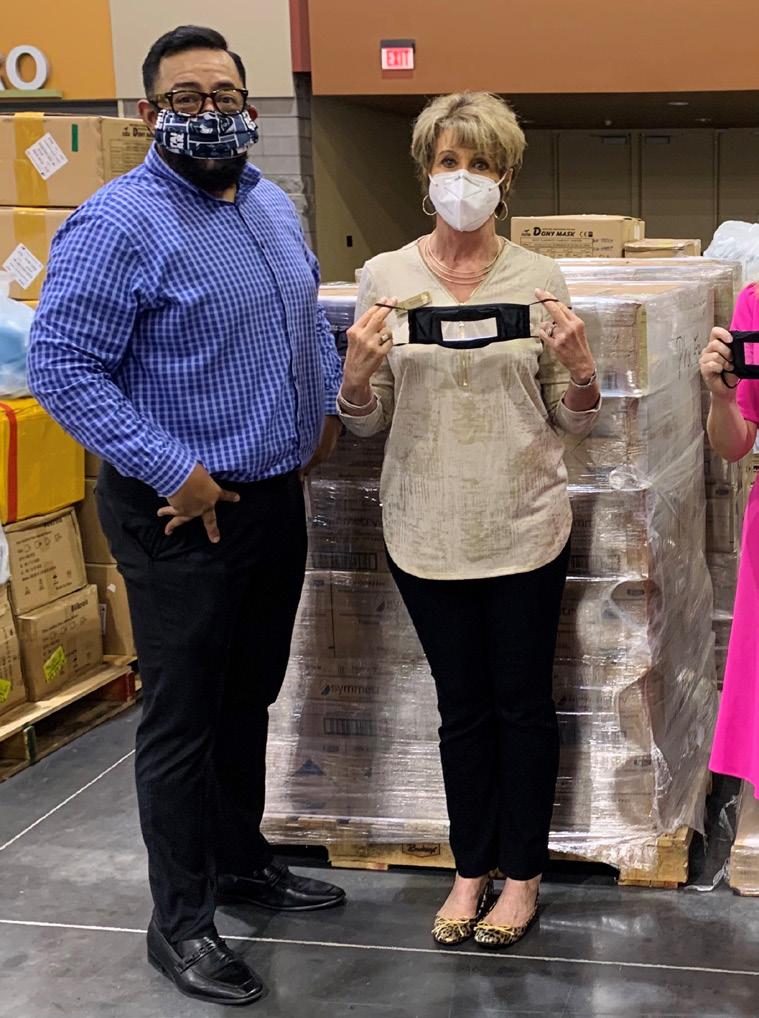
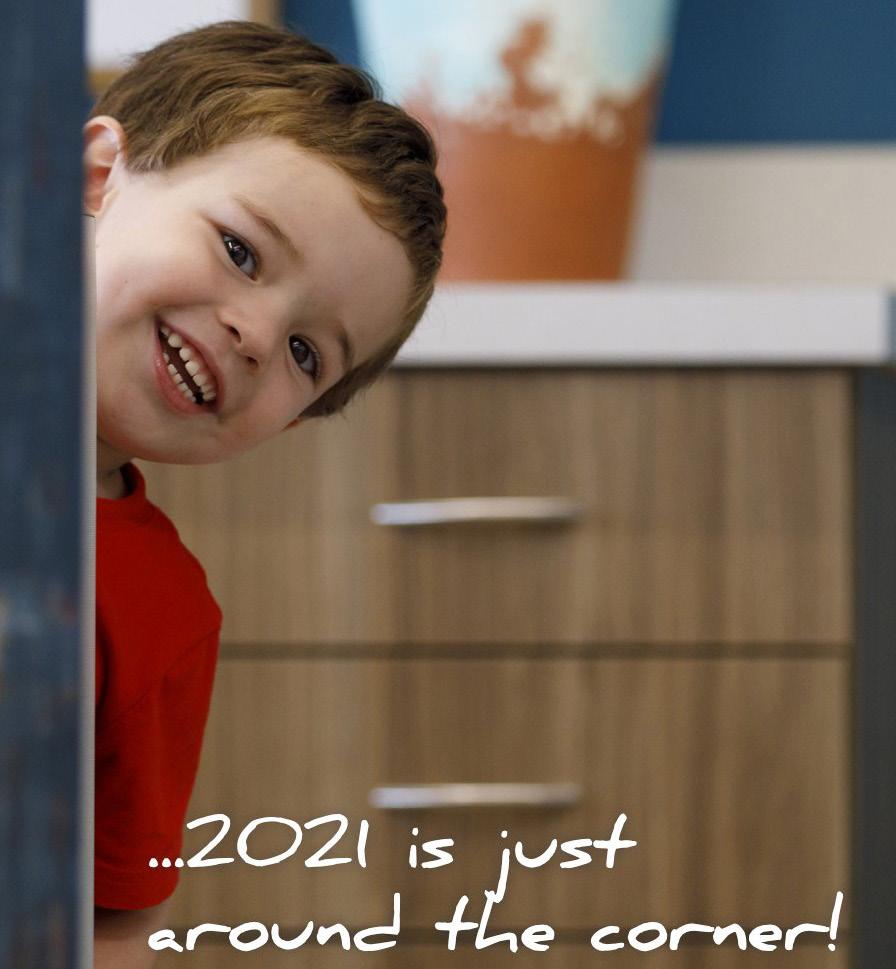
Aside from the virus, what is the most pressing challenge facing the city of Phoenix?
Our single biggest challenge – now and even after we have defeated COVID – will be leading the Phoenix economy toward its recovery. People have lost their jobs, families and individuals are on the verge of losing their homes, and businesses have been hit very hard.
Yet, because of the efforts we’ve made, Phoenix is in a good position. Of the top ten construction markets in the country, we are the only city that saw construction expenditures increase during the pandemic. Just a few weeks ago, we succeeded in bringing chip manufacturer TSMC to north Phoenix. It is the largest business development deal in Arizona history and will bring nearly 2,000 new, high-paying jobs along with it. Our precision medicine, research and advanced biomedical manufacturing
sectors are drawing global attention.
Workforce development – the training that helps people land these kinds of good jobs – will continue to be a focus of mine, as will bringing even more economic development to Phoenix. It’s how we will climb out of this viral recession and into an even brighter future.
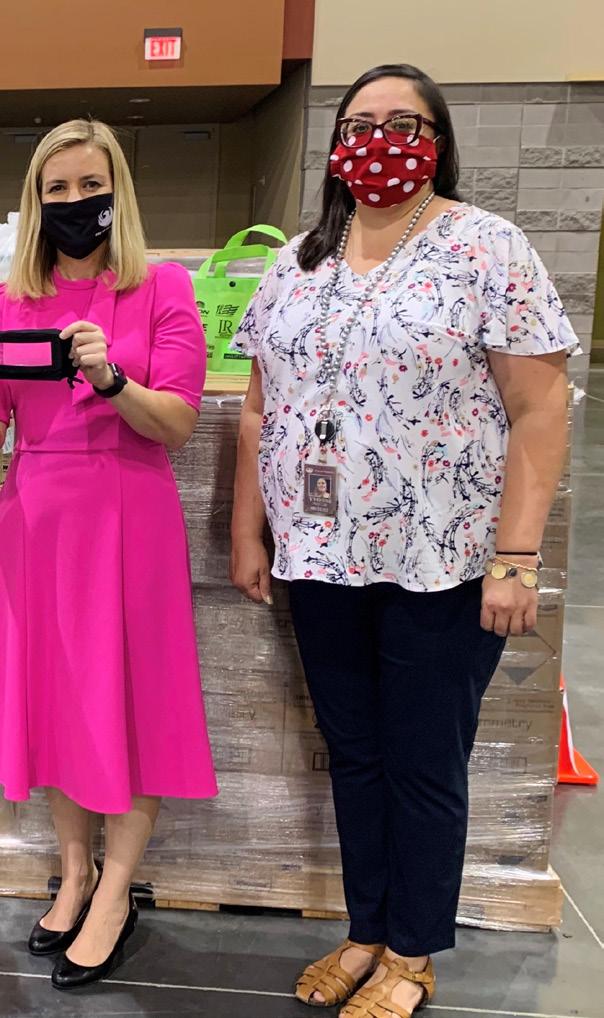
Is there a passion project that you are working on for the future of the city?
That’s T2050, hands down. T2050 stands for Transportation 2050, the voter-approved plan for expanding bus service, light rail and street improvements. Yes, those street improvements include filling potholes, which we’ve done quite a lot of this year, paving more miles than ever before. Recently, Phoenix has been awarded grants of well over a half-billion dollars from the federal government, which will help us complete the South Central extension of the light rail. We are experiencing some great momentum, and I intend to keep that going.
Next year, you’ll hear me speak quite a bit about the extension of Prop 400. The original proposition created a dedicated funding source for transit and transportation. By passing an extension, voters will help us complete the transformative work we’ve already begun.
My deep interest in these issues is born of personal experience. Shortly after I was elected to the city council, I experienced a seizure and had to temporarily give up driving. I learned first-hand that it is not easy to navigate this city without a car. The work we’re doing now will ensure we have a Phoenix that is cleaner and easier to get around in, especially for those who can’t afford a car or can’t drive.
The mayor’s 2020 holiday card with son, Michael.
Mayor Gallego announced the City of Phoenix’s donation of more than one million pieces of PPE to school districts across the Valley.
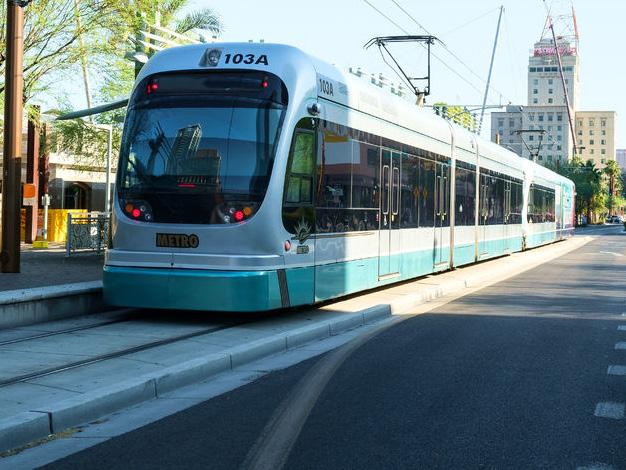
A future dream, the expansion of voter-approved Transportation 2050
What’s the best advice you’ve ever received?
“Never doubt that a small group of thoughtful, committed, citizens can change the world. Indeed, it is the only thing that ever has.” - Margaret Mead
What advice would you like to give young people wanting to become involved in politics?
I think it’s very important to follow the news and understand current events. Even though it may not be their first choice, I advise young people to read newspapers, listen to morning news, and follow reputable sources of online information, then be willing to talk with others to understand their perspective about the issues. I urge them to read constantly (news and non-news), meet people in other communities, and put serious, focused effort into understanding what other people think and why.
It’s equally important to come to this work with a strong set of values that help you to remember why you got engaged in the first place.
What are your plans for the future?
People sometimes forget that for the past almost two years, I have been filling out the term Greg Stanton left open when he ran for and won a seat in Congress. In April, I’ll be sworn-in to my first full term as mayor, and I’m looking forward to having those four years to continue to build on what we’ve started and to recover from the challenges of 2020.
On the personal side, I’m helping my son learn to read, and in that process, passing on another of my passions to him. ç










